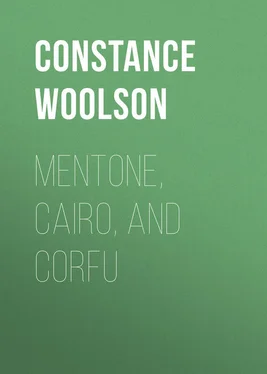Constance Woolson - Mentone, Cairo, and Corfu
Здесь есть возможность читать онлайн «Constance Woolson - Mentone, Cairo, and Corfu» — ознакомительный отрывок электронной книги совершенно бесплатно, а после прочтения отрывка купить полную версию. В некоторых случаях можно слушать аудио, скачать через торрент в формате fb2 и присутствует краткое содержание. ISBN: , Жанр: foreign_prose, на английском языке. Описание произведения, (предисловие) а так же отзывы посетителей доступны на портале библиотеки ЛибКат.
- Название:Mentone, Cairo, and Corfu
- Автор:
- Жанр:
- Год:неизвестен
- ISBN:http://www.gutenberg.org/ebooks/33367
- Рейтинг книги:4 / 5. Голосов: 1
-
Избранное:Добавить в избранное
- Отзывы:
-
Ваша оценка:
- 80
- 1
- 2
- 3
- 4
- 5
Mentone, Cairo, and Corfu: краткое содержание, описание и аннотация
Предлагаем к чтению аннотацию, описание, краткое содержание или предисловие (зависит от того, что написал сам автор книги «Mentone, Cairo, and Corfu»). Если вы не нашли необходимую информацию о книге — напишите в комментариях, мы постараемся отыскать её.
Mentone, Cairo, and Corfu — читать онлайн ознакомительный отрывок
Ниже представлен текст книги, разбитый по страницам. Система сохранения места последней прочитанной страницы, позволяет с удобством читать онлайн бесплатно книгу «Mentone, Cairo, and Corfu», без необходимости каждый раз заново искать на чём Вы остановились. Поставьте закладку, и сможете в любой момент перейти на страницу, на которой закончили чтение.
Интервал:
Закладка:
"And if we are but 'ten minutes' walk from Italy' – a phrase so often repeated – what of it?" said Miss Graves to Margaret. "We are simply ten minutes' walk from a most uncleanly land." Miss Graves always wore a gray worsted shawl, and took no wine; in spite of the sunshine, therefore, she preserved a frosty appearance.
After breakfast Miss Elaine introduced herself to Mrs. Trescott. She had met some Americans the year before; they were charming; they were from Brazil; perhaps we knew them? She had always felt ever since that all Americans were her dear, dear friends. She had an invalid mother up-stairs (sharing her good opinion of Americans) who would be "very pleased" to make our acquaintance; and hearing Pont St. Louis mentioned, she assured Janet that it was a "very jolly place – very jolly indeed." It ended in our going to the "jolly place," accompanied by the two artists and Miss Elaine herself, who smiled upon us all, upon the rocks, the sky, and the sea, in the most amiable and continuous manner. This time we were not all on foot; one of the loose-jointed little Mentone phaetons, with a great deal of driver and whip and very little horse, had been engaged for Mrs. Trescott and Margaret. This left Mrs. Clary and myself together (Miss Graves having remained at home), and Inness, Baker, the Professor, Verney, and the other artist, whose name was Lloyd, all trying to walk with Janet, while Miss Elaine devoted herself in turn to the unsuccessful ones, and never from first to last perceived the real situation.
We went eastward. Presently we passed a small house bearing the following naïve inscription in French on the side towards the road: "The first villa built at Mentone, in 1855, to attract hither the strangers. The sun, the sea, and the soft air combined are benefactions bestowed upon us by the good God. Thanks be to Him, therefore, for His mercies in thus favoring us."
"Mentone is said to have been 'discovered by the English' in 1857," said Mrs. Clary. "Dr. Bennet, the London physician, may be called its real discoverer, as Lord Brougham was the discoverer of Cannes. From a sleepy, unknown little Riviera village it has grown into the winter resort we now see, with fifty hotels and two hundred villas full of strangers from all parts of the world."
The Professor was discoursing upon the climate. "It is very beneficial to all whose lungs are delicate," he said. "Also" (checking off the different classes on his fingers) "to the aged, to those who need general renovating, to the rheumatic, and to those afflicted with gout."
"Where, then, do I come in?" said Janet, sweetly, as he finished the left hand.
"Nowhere," answered the Professor, meaning to be gallant, but not quite succeeding. Perceiving this, he added, slowly, and with solemnity, "But the fair and healthy flower should be willing to shine upon the less endowed for the pure beneficence of the act."
Baker and Inness sat down on the sea-wall behind him to recover from this. The two Englishmen were equally amused, although Miss Elaine, who was walking with them, did not discover it. However, Miss Elaine seldom discovered anything save herself. We now began to ascend, passing between the high walls of villa gardens along a smooth, broad, white road.
"This is the Cornice," said Mrs. Clary; "it winds along this coast from Marseilles to Genoa."
"From Nice to Genoa," said the Professor, turning to correct her. But by turning he lost his place. Inness slipped into it, and not only that, but into his information also. In the leisure hour or two before and after "breakfast," Inness had carried out his threat of "studying up," and we soon became aware of it.
"The genius of Napoleon, Miss Trescott," he began, "caused this wonderful road to spring from the bosom of the mighty rock."
"Before it there was no road, only a mule track," said the Professor from behind.
"I beg your pardon," said Inness, suavely, "but there was a road, the old Roman way, called Via Julia Augusta, traces of which are still to be seen at more than one point in this neighborhood."
"Ah!" said the Professor, surprised by this unexpected antiquity, "you are going back to the Roman period. I have omitted that."
"But I have not," replied Inness. "The Romans were a remarkable people, and all their relics are penetrated with the profoundest interest for me. I am aware, however, that other minds are more modern," he added, carelessly, with an air of patronage, which so delighted Baker that he fell behind to conceal it.
"The Cornichy, Miss Trescott, as we pronounce the Italian word (Corniche in French), is almost our own word cornice," pursued Inness, "meaning a shelf or ledge along the side of the mountain. It was begun by Napoleon, and has been finished by the energy of successive governments since the death of that wonderful man, who was all governments in one."
"You surprise me," said Janet, breaking into laughter.
"Not more than you do me," I said, joining her.
The Professor (who had rather neglected the Cornice in his Cyclopean information) gazed at us inquiringly, surprised at our merriment.
"The best description of the Cornice, I think, is the one in Ruffini's novel called Doctor Antonio " said Mrs. Clary. "The scene is laid at Bordighera, you know, that little white town on the eastern point so conspicuous from Mentone. Of course you all remember Doctor Antonio ?"
Presently our road wound around a curve, and we came upon a wild gorge, spanned by a bridge with a sentinel's box at each end; one side was France and the other Italy. The bridge, the official boundary line between the two countries, is a single arch thrown across the gorge, which is singularly stern, great masses of bare gray rock rising perpendicularly hundreds of feet into the air, with a little rill of water trickling down on one side, trying to create a tiny line of verdure. Below was an old aqueduct on arches, which the Professor hastened to say was "Roman."
"The Romans must have been enormous drinkers of water," observed Baker, as we looked down. "The first thing they made in every conquered country was an aqueduct. What could have given the name to Roman punch?"
"Do you see that narrow track cut in the face of the rock?" said Mrs. Clary, pointing out a line crossing one side of the gorge at a dizzy height. "It is a little path beside a watercourse, and so narrow that in some places there is not room for one's two feet. The wall of rock rises, as you see, perpendicularly hundreds of feet on one side, and falls away hundreds of feet perpendicularly on the other; there is nothing to hold on by, and in addition the glancing motion of the little stream, running rapidly downhill along the edge, makes the path still more dizzy. Yet the peasants coming down from Ciotti – a village above us – use it, as it shortens the distance to town. And there are those among the strangers too who try it, generally, I must confess, of our race. The French and Italians say, with a shrug, 'It is only the English and Americans who enjoy such risks.'"
"It does not look so narrow," said Janet. Then, as we exclaimed, she added, "I mean, not wide enough for one's two feet."
"Feet," remarked Inness, in a general way, as if addressing the gorge, "are not all of the same size."
We happened to be standing in a row, with our backs against the southern parapet of the bridge, looking up at the little path; the result was that eighteen feet were plainly visible on the white dust of the bridge, and, naturally enough, at Inness's speech eighteen eyes looked downward and noted them. There were the Professor's boots, the laced shoes of the younger men, the comfortable foot-gear of Mrs. Clary and myself, the broad substantial soles of Miss Elaine, and a certain dainty little pair of high-arched, high-heeled boots, which, small as they were, were yet quite large enough for the pretty feet they contained. I thought Miss Elaine would be vexed; but no, not at all. It never occurred to Miss Elaine to doubt the perfection of any of her attributes. But now Mrs. Trescott's phaeton, which had started later, reached the bridge, and the gorge, path, and aqueduct had to be explained to her. Lloyd undertook this.
Читать дальшеИнтервал:
Закладка:
Похожие книги на «Mentone, Cairo, and Corfu»
Представляем Вашему вниманию похожие книги на «Mentone, Cairo, and Corfu» списком для выбора. Мы отобрали схожую по названию и смыслу литературу в надежде предоставить читателям больше вариантов отыскать новые, интересные, ещё непрочитанные произведения.
Обсуждение, отзывы о книге «Mentone, Cairo, and Corfu» и просто собственные мнения читателей. Оставьте ваши комментарии, напишите, что Вы думаете о произведении, его смысле или главных героях. Укажите что конкретно понравилось, а что нет, и почему Вы так считаете.












